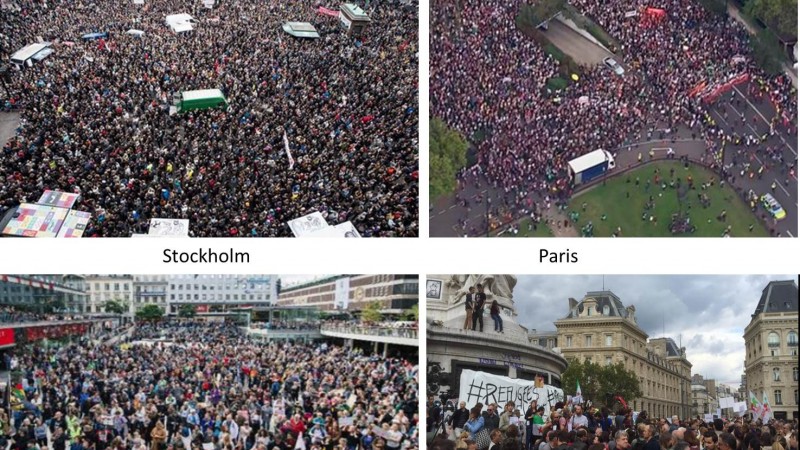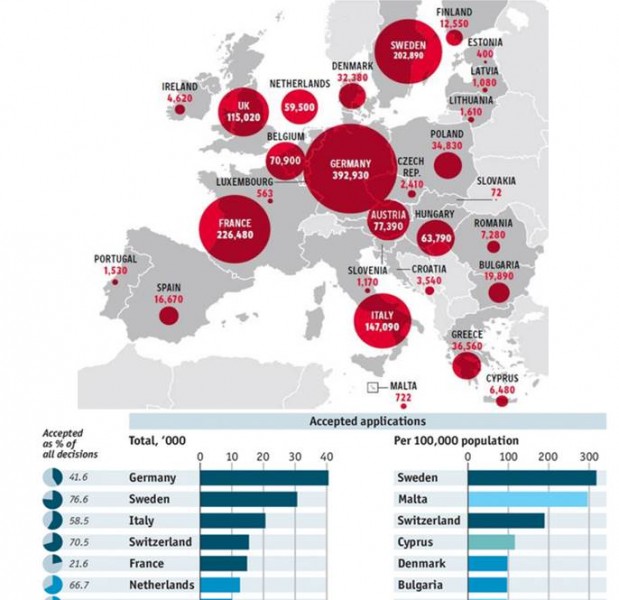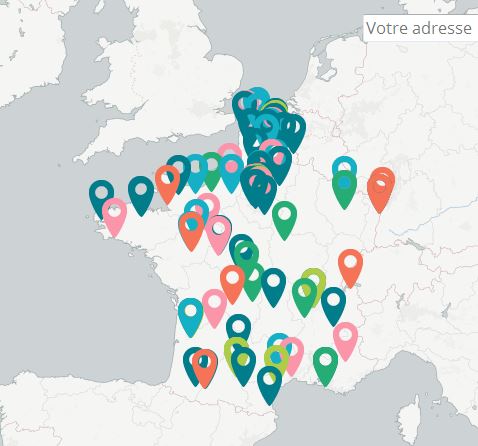
Demonstrations in large European cities in favor of refugees (various sources)
Hundreds of thousands of Europeans took to the streets in the continent's urban centers on 12 September 2015 to show their solidarity with the steady stream of refugees who cross the Mediterranean on makeshift boats.
The reception of the refugees, fleeing conflict in Syria, Afghanistan and other countries in Africa and the Middle East, is organized in different ways throughout Europe. National policies vary by country among politicians as well as among volunteer organizations. Despite harmonization efforts between countries of the European Union, the disparity in welcoming measures between the countries is obvious: Germany anticipates welcoming 98,700 Syrian refugees in 2015 [1] (and 500,000 per year over the next few years), while France anticipates 6,700 [1] in 2015 (and 24,000 over the next two years), and the United Kingdom 7,000 [1](20,000 over the next five years).

Data on the refugees in Europe. Red dots indicate asylum applications from 2011 to 2014 (sources: The Economist and The Independent)
Citizens’ initiatives are also increasing in all countries committed to solidarity with the refugees. In Iceland, 10,000 Icelanders created a Facebook page [2] and launched a petition to welcome the refugees. In Germany, a group of citizens launched the platform “Refugees Welcome” [3] that consolidates households wishing to share their homes with refugees. Many fundraisers were set up to bring food to the migrants.
Bedroom available? Host a refugee
In France, one of the initiatives is that of SINGA, which describes itself as a “community of human beings hoping to better know and better understand each other.” SINGA launched project CALM [4] (Comme à La Maison, or “Like at home”) that consists of a platform connecting all households wishing to welcome refugees in France. SINGA also explains that: [4]
Ce réseau permet la mise en relation entre des réfugiés mal logés ou sans domicile fixe et des particuliers. Pour cela, il s’appuie sur une communauté grandissante de citoyens souhaitant s’engager sur l’accueil des réfugiés et, à terme, sur une plateforme web qui permettra un impact plus important. Ce dispositif doit répondre, au-delà de l’hébergement, au besoin important et grandissant d’inclusion socio-professionnelle.
This network makes partnerships between homeless refugees or those living in substandard accommodations and private individuals possible. It relies on a growing community of citizens wishing to commit to hosting refugees and on an online platform that will allow for a more important impact. This plan must respond, beyond accommodations, to the important and growing need of socio-professional inclusion.
To do this, the association created an online form [6] for people to register as potential hosts.
The site's online release consolidated a map [7] of all the associations assisting refugees in France, allowing them to work locally throughout the territory.
A moral and economic lesson
A large part of the population, however, at one point viewed the arrival of refugees with suspicion. An Odoxa survey conducted 5 September showed that 55% of French people were against France “following Germany's lead in ignoring European Union refugee rules [8] (i.e. deport them back to their port of entry) for Syrians specifically and relaxing the conditions for granting refugee status to asylum-seekers” (This is the exact terms that the Odoxa survey used to pose the question). This percentage has allegedly changed over [9] the last few days, as now more than 50% of French citizens are in favor of more lax policies, probably because of heightened awareness of the plight refugees and rising number of children's deaths at sea.
Isabelle, a Paris resident, explains that she does not always understand [10] the difference in terminology:
Migrants”, “réfugiés”, “immigrés”, la distinction n'est pas toujours évidente. Il faudrait d'abord qu'on nous explique clairement la différence.
“Migrants”, “refugees,” “immigrants,” the distinction is not always evident. First of all, it is necessary that they clearly explain the difference to us.
Fabien, also living the Paris area, thinks that it is necessary to first deal with the problem at its source [10]:
Je comprends ces gens, ils n'ont pas d'autre choix que de fuir les combats. Le problème est que nous ne occupons que des conséquences de ces guerres, pas de leurs causes. Nous sommes pourtant pleinement responsables de la situation en Syrie et en Libye.
I understand these people, they don't have a choice other than to run away from the fighting. The problem is that we only worry about the consequences of these wars, not their causes. We are, however, fully responsible for the situation in Syria and in Libya.
Sylvain Attal, a French reporter and columnist, explains that these misgivings are not justified [11]:
À défaut d’avoir pu et su intervenir il y a quatre ans, si nous voulons rester cohérents avec nous-mêmes, notre devoir est d’organiser dignement l’accueil de ces réfugiés. On enverra alors un message aux futures recrues de l’EI tentées de commettre des attentats sur notre sol : nous ne sommes pas contre les musulmans. [..] Aucun dispositif sécuritaire ne dissuadera jamais ceux qui veulent fuir la guerre pour donner un avenir à leurs enfants de venir le chercher en Europe. Ils ne sont pas attirés, comme on l’entend souvent, par la générosité de notre système d’aides sociales mais souhaitent trouver ici des opportunités de gagner dignement leur vie. Si ce n’était pas le cas, ils ne choisiraient pas d’abord l’Allemagne ou le Royaume-Uni mais plutôt… la France ! [..] En Allemagne, Angela Merkel ne pense d’ailleurs pas que les réfugiés vont voler le travail des Allemands mais au contraire qu’ils peuvent contribuer à changer le pays, pour le meilleur. Elle pense qu’elle fait un investissement. Et en cela elle donne une leçon au reste de l’Europe qui n’est pas seulement morale, mais aussi économique.
For a lack of being able to and knowing how to intervene for four years, if we want to remain true to ourselves, our duty is to organize the reception of these refugees with dignity. We will then send a message to future ISIS recruits tempted to perpetrate attacks on our soil: we are not against Muslims. […] No security measures will ever dissuade those who want to escape war in order to give their children a better future to come and search for that future in Europe. They are not attracted to, as we so often hear, the generosity of our social systems. They hope to find opportunities here to earn a good living in a dignified way. If this was not the case, they would not first choose Germany or the United Kingdom, but rather…France! In Germany, Angela Merkel does not think that the refugees will steal German jobs. On the contrary, they will contribute to changing the country for the better. She thinks that she is making an investment. In doing so, she is giving a lesson to the rest of Europe that is not only moral, but also economic.
The ‘missing safeguard’ of diplomacy
While certain people show signs of mistrust, a French diplomat revealed an exacerbated cynicism in the face of the refugees’ tragedy. The honorary French consul in Turkey, Françoise Olcay, confessed to taking advantage of their despondency in wishing to reach Europe by selling inflatable rafts and life jackets to migrants [12]and refugees trying to get to Greece at the risk of their life:
When asked why she did not stop this business, she responded that if she stops, others will follow in her place. Olcay was suspended from her duties 12 September. Erika Colognon Hajaji, a journalist and blogger from Madagascar, thinks that the honorary consul's actions reflect the global failure of diplomacy [13] in the management of current crises:
La diplomatie est bien le chainon manquant à tous nos dérapages et qui ont engendré toutes ces guerres préventives et ouvertures de voies de circulation des migrants, mais aussi des intégristes qui ont pris la Libye dès que Sarkozy l'a… libérée. L'échec premier est de la responsabilité de cette diplomatie. Notre diplomatie en général, celle de l'Afrique, de l'Asie, de la France, de l'Europe, doit mieux œuvrer a être apte à endosser les responsabilités qui sont les siennes [..] Rien ne saura redonner le calme d'hier aux terres ensanglantées d'aujourd'hui.
Diplomacy is the missing safeguard to all of the misdeeds that have been at the source of all of these preventative wars and the surge of migrant trafficking, as well as the rise of fundamentalists who took Libya when [former French President] Sarkozy “liberated” it. The first failure is the responsibility of this diplomacy. In general, our diplomacy in Africa, Asia, France, and Europe must work better in order to take on its responsibility. […] Nothing can bring back its former peace to all the bloodied lands today.

